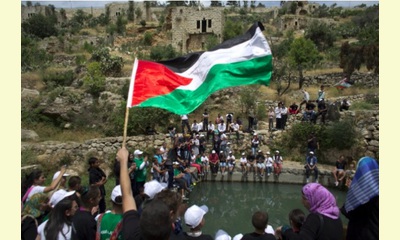|
|
Israelis rattled by search for truth about the Nakba
un articulo por Jonathan Cook, Middle East Eye
December 9. The first-ever “truth commission” in
Israel, to be held on Wednesday, will feature
confessions from veteran Israeli fighters of the
1948 war who are expected to admit to
perpetrating war crimes. 
Palestinians wave the national flag during a protest in the Palestinian village of Lifta (AFP)
click on photo to enlarge
The nine-month war that broke out in May of that
year saw hundreds of thousands of Palestinians
expelled from their homes and thousands killed.
The commission is the culmination of more than
decade of antagonistic confrontations between a
small group of activists called Zochrot, the
Hebrew word for Remembering, and the Israeli
authorities as well as much of the Jewish public.
Founded in 2002, Zochrot is dedicated to
educating Israeli Jews about what Palestinians
call the Nakba, Arabic for catastrophe, referring to
Israel’s creation on the ruins of their homeland
more than six decades ago. The group also
campaigns for the right of return for Palestinian
refugees to Israel, probably the biggest taboo in
Israeli society.
The commission, which has no official standing,
could be the first of several such events around
Israel, to investigate atrocities and war crimes
committed in different localities, said Liat
Rosenberg, Zochrot’s director.
“We have looked to other such commissions
around the world as models, most obviously in
South Africa,” she said. “But unlike the one there,
ours does not include the element of reconciliation
because the conflict here has yet to be resolved.
“We cannot talk about reconciliation when the
Nakba is ongoing. We are still in a situation where
there is apartheid, constant violations of human
rights and 70 percent of the Palestinian
community are refugees.”
The commission is likely to provoke outrage from
the Israeli government, which passed the so-
called Nakba Law in 2011 to try to make it harder
to commemorate Palestinian suffering. The impact
of the law is being widely felt. Just last month, the
culture ministry vowed to block a government
grant to a Tel Aviv cultural centre that hosted a
Zochrot film festival on the Nakba.
Rosenberg said Israeli veteran fighters and
Palestinian witnesses participating in the truth
commission had asked for their names to be kept
secret until the hearings for fear that friends and
family would put pressure on them to withdraw.
The commission is being held in the city of
Beersheva, a once-Bedouin town that was
ethnically cleansed in 1948 and is today the
largest Jewish city in the Negev region in southern
Israel.
Zochrot said it had chosen the city to host the first
event because forced expulsions of Bedouin from
the Negev had taken place not only in 1948, but
had continued on a large scale, out of view of
observers, for many years afterwards.
The commission is the latest project by Zochrot
that discredits a traditional Israeli narrative that
some 750,000 Palestinians left under orders from
Arab leaders and that Israel’s army acted only in
self-defence. Such beliefs have fed into the
common assumption from the Israeli public that
Israel’s army is the “most moral in the world”.
(This article is continued in the discussionboard)
|








|
DISCUSSION
No hay pregunta ligada a este article.
* * * * *
Comentario más reciente:
(The following is continued from the main article listed above.)
“This is not just about researching the truth,” said Rosenberg. “The truth of the Nakba is to a large degree known, but the task is to expose the truth to the Israeli Jewish public - both so that it is forced to take responsibility for what happened and so there can be accountability.”
The commission is the direct result of a project launched by Zochrot two years ago to create an alternative archive of the Nakba, based on filmed testimonies from Palestinian refugees and Israeli veterans. Activists fear that, as the generation of refugees and fighters dies off, they will take their secrets to the grave.
Israeli military archives relating to the 1948 war began being opened to academics in the late 1980s. This led to a group of so-called ‘new historians’ overturning the traditional accounts of that period and unearthing written evidence of massacres and ethnic cleansing operations for the first time.
However, historians have reported in recent years that the Israeli authorities have become more reluctant to open files and many of the more controversial episodes of the 1948 war are still unclear.
Rosenberg hopes that tomorrow’s commission will begin to fill some of the gaps.
According to Rosenberg, three Israeli fighters and three Palestinian witnesses will testify before a panel of six commissioners. The commissioners will then question them further about events and make follow up recommendations.
The hearings are due to be streamed online.
One veteran of the fighting in the Negev, Amnon Neumann, has already gone on record in a testimony, which can be seen in Zochrot’s film archive.
He has said the Bedouin in the Negev – contrary to popular Israeli perception – put up almost no resistance to advancing Jewish forces because they lacked “a military capacity” and “had no weapons”.
Nonetheless, he said, the Israeli army terrified the Bedouin villagers out of their homes by shooting either at them, or above their heads.
“We drove them out. Women and children went to Gaza. … By the morning there was nobody there. We burnt their houses,” Neumann said.
When villagers tried to sneak back to tend crops or vineyards under the cover of night, Neumann recounted, the soldiers opened fire.
“We would shoot and kill them. . ... continuación.

|
|









